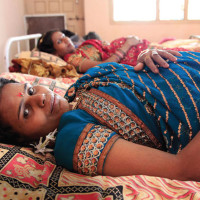India may be about to place a ban on the practice of allowing foreigners to pay women to carry surrogate babies.
India is one of the top countries in the world for couples searching for surrogacy that can be done far more cheaply than in the United States and elsewhere. It is a booming — and largely unregulated — business with thousands of clinics across India as the backbone of an estimated $400 million-a-year industry, according to a study by Sama, a New Delhi-based advocacy group for women and children.

Foreigners are thought to pay Indian women to carry about 3,000 babies per year
Critics have long said that fertility clinics and their clients exploit surrogate mothers — often poor and illiterate women from rural areas who are paid little. A surrogate mother profiled in The Washington Post was paid $8,000: an amount 12 times what she made as a garment worker.
Abuses abound, however, and the practice has been derided as “rent-a-womb.” India’s own Supreme Court recently called it “surrogacy tourism” and called for a ban.
The government submitted an affidavit to the Supreme Court on Wednesday saying it “does not support commercial surrogacy” and that “no foreigners can avail surrogacy services in India,” although the service would be still available to Indian couples.
India has been trying to pass a new Assisted Reproductive Technologies Act since 2010, and a draft of the legislation up for public comment until November 15 does not specify the ban on foreign couples. But it suggests stricter regulations on the practice such as limiting the number of surrogate births from a mother to one.
However, the Ministry of Health and Family Welfare is pushing for an outright ban on allowing foreign couples to hire Indian surrogates, activists say. In 2012, the government banned singles and homosexuals from abroad from coming to India to use surrogates.
“In meetings officials have said foreign nationals are exploiting our women,” said Manasi Mishra, who did a survey on surrogacy for the Centre for Social Research in New Delhi and has been a part of the discussion on the new law.
“We don’t agree there should be a ban on foreign nationals coming here for surrogate babies. We have been asking for regulating the industry. The industry has grown so much. If you ban it, everything will go underground and illegal.”
India and the United States are among a handful of countries where the practice of in-vitro fertilization and embryo transfer is allowed. Thailand just banned it recently. More than 6,000 surrogate babies are born in India per year, about half of them to foreign couples, according to one industry estimate.
“We are taken aback by the government’s stand against foreign nationals,” said Jagatjeet Singh, a surrogacy consultant in New Delhi. “On one hand, the government is romoting foreign investment and the medical tourism industry. And on the other, they are talking of banning foreign nationals from coming to India for surrogate babies. There are dual standards.”









